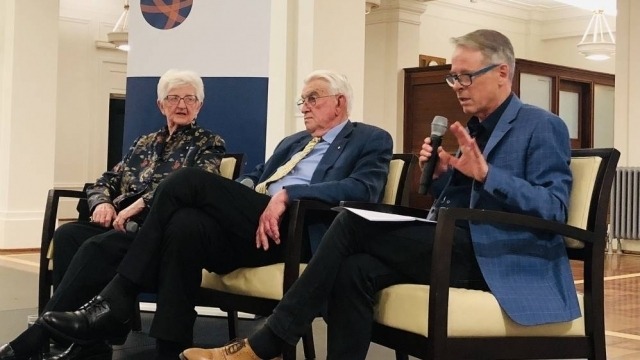Opinion: John Kerin was a man of substance in the mayhem of Australian politics

By Mark Kenny
A version of this article was originally published by The Canberra Times.
Time and tides bring some sad, funny, and depressing resonances.
As Treasurer Jim Chalmers knuckles down to a tricky budget over the next five weeks, a former Labor treasurer will be remembered.
On learning of the death of John Kerin last week, several people observed (your columnist among them) that Kerin was not only the longest serving agriculture minister the country had seen, but probably also its best.
This is widely accepted but is just an opinion.
It is quietly astonishing that of Bob Hawke's initial 1983 cabinet, just four are surviving. Paul Keating, Gareth Evans, Bill Hayden, and Ralph Willis. Big names like Kim Beazley, Neal Blewett, and Barry Jones, were in the outer ministry. John Dawkins, entered cabinet just months into the new government's term, but was not in cabinet initially.
Keating remains a keen-spirited presence in Australian political debate, and Evans, too is powering, having been in the capital a fortnight ago to attend his eponymous oration at ANU where he was Chancellor.
It is as a creative reforming primary industries minister rather than as Hawke's reserve treasurer that the 85-year-old Kerin is most admiringly remembered.
His term in the top economic post - sparked by the first unsuccessful leadership tilt by Paul Keating - was cut short, having not gone as well as either he or Hawke would have hoped.
Following directly on from Keating was always a tough assignment and Kerin quickly became a target for the campaign to bring down Hawke.
A signature moment came during a press conference when the well qualified Kerin - he had an economics degree from ANU - had struggled with one of the acronyms - the GOS or gross operating surplus. Critics pounced.
However reluctantly, Hawke replaced him with Willis.
That Kerin had scaled that height, given he was factionally unaligned, spoke volumes about his merits. His principles never wavered.
Kerin had stuck with the less fashionable Hayden when Hawke challenged in February 1983, and then stayed loyal to Hawke as the Keating juggernaut proved unstoppable.
Kerin would later remark that he felt he had let Hawke down, which was typical of his self-effacement.
Primary industries however, was a more positive story.
Inevitably there are those who because of political affiliation, will say Kerin was bettered by somebody else.
Said one brave soldier of anonymity on Twitter: "Jack 'Black' McEwen by a country mile - if Kenny had read any history on Australian politics even he would have to agree." Clearly my abrasive respondent's own reading had not extended to knowing it was "Black Jack McEwen" rather than "Jack "Black" McEwen".
Nonetheless, the response reminds us of the multiple conceptions of ministerial performance. Substantive ones like legislative reform record, administrative effectiveness, and the goodwill of those affected. And less substantive ones like, servicing the political base, self-promotion, and naked ambition.
I recently had Kerin sitting with me on a stage in the Kings Hall of Old Parliament House along with the wonderful trail-blazing feminist bureaucrat, Marie Coleman - whose 90th birthday I since attended.
It was the 50th anniversary of the election of the Whitlam Government and the pair spoke engagingly about the times, the public mood for social modernisation, and the roiling tumult of that dawning political era. It was vital oral history.
Kerin had ridden that tumult personally. He came to Canberra as a new backbencher in the "It's Time" wave, and was washed away three years later in the post-Dismissal rout. When Whitlam retired a couple of years after that, Kerin saw off two factionally supported candidates in a bitter preselection for his prize seat of Werriwa. Back in harness, he stayed for 15 years, including that troubled six-month stint as treasurer and a record eight years in primary industry and energy.
Having grown up on a chicken farm in the Southern Highlands - apparently he could hypnotise chooks - Kerin uniquely understood the social centrality of family farms to rural and regional economies.
Yet he also recognised they were inefficient and were increasingly unviable. Yet tighter regulatory protection was not going to cut it in a globalising world.
But it wasn't just the protectionist Nats he had to overcome. In one witty exchange as he moved to unpick stultifying regulations in the dairy industry, two vocal Labor backbenchers, Jim Snow (Eden-Monaro) and Keith Wright (Capricornia) challenged his plans to remove restrictive rules cosseting the sector.
The duo dressed the minister down in front of colleagues in the Caucus meeting laying out a whole set of alternative arrangements to appease angry farmers in their electorates. Kerin listened respectfully until they were done, then got up and said, "I see, so it's Snow Wright and the seven dairy plans, is it?" With the peal of laughter that followed, he'd won the debate.
Stories of Kerin's wit and unboastful manner abound.
He may not be a household name, but his passing marks the passing of an era of political representation where a thoughtful individual of substance and application could actually prevail.
Within hours of Kerin's last breaths, a subsequent member for Werriwa (and current member of the NSW upper house) who became leader of the federal ALP, was making headlines for revolting homophobic abuse hurled publicly at a fellow legislator.
It is ironic that Kerin, among the parliament's most civilised figures, had intentionally delayed his retirement to facilitate the entry to federal parliament of the coarse and bigoted Mark Latham.
Like I said, there were some depressing resonances, too.
Mark Kenny is a professor at the ANU Australian Studies Institute and host of the Democracy Sausage podcast.








